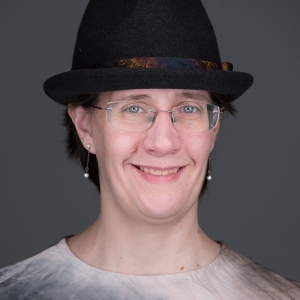It may come as no surprise that a string theory researcher like Nelia Mann, who investigates the most fundamental laws of physics, turns to science fiction in her spare time. As for teaching, she enjoys guiding students through quantum mechanics, statistical mechanics and computational physics to deepen their understanding of physical processes. Among her pandemic accomplishments, in her basement, she created a state-of-the-art Zoom studio complete with such necessities as multiple cameras, top-notch lighting, wireless headset and a large whiteboard- and for fun, a green screen.
FIRST APP YOU LOOK AT IN THE MORNING:
The New York Times
ONE BOOK YOU HAVE READ MULTIPLE TIMES:
“A Canticle for Leibowitz” by Walter Miller. There’s a lot I could say about “Canticle,” but I think something that always resonates with me is the way his characters inhabit a world that is both absurd and doomed, and yet he is still able to imbue their lives with meaning.
BEST ADVICE YOU EVER RECEIVED:
Don't worry about whether or not you're "good enough" to do something. Instead, worry about whether or not it's actually what you want to do.
FAVORITE SPOT ON CAMPUS:
Ice cream at Reamer (maybe more about the ice cream than the location)
GO-TO BREAKFAST:
Chocolate-flavored tea
NETFLIX OR AMAZON:
Netflix
FAVORITE PODCAST:
None
ONE SKILL YOU WISH YOU HAD:
Construction/woodworking/metalworking
ANOTHER SUBJECT YOU WISH YOU COULD TEACH:
Science fiction
MOST CREATIVE EXCUSE YOU HEARD FOR A LATE ASSIGNMENT:
I can't think of a good one, but I'll tell a semi-related story. I once assigned a journal article associated to a classic modern physics experiment from the 1930s to read and then summarize as a mock lab report. One student clearly tried to write the report without reading the article - what he turned in included a rather anachronistic (and entertaining) description of the role that lasers played in the experiment.

